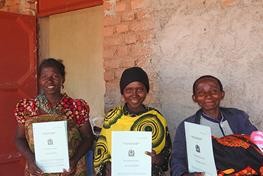Speeches Shim

Nilumba Ngogo used to worry that her uncle would one day claim the four acres of land she inherited from her parents. As a result, she only used a small plot for subsistence farming and never invested in more profitable cash crops. For Martha Paulo Mwilongo, a land dispute with her neighbor kept her from selling or renting part of her 11 acres to earn extra income. For Janet Jailos, disagreement among her family members over land ownership resulted in several fields being uncultivated.
Fortunately, things began to change for these three women, all from the village of Matembo, after the USAID Land Tenure Assistance project came to meet with their community women’s group.
The project works with residents, farmers, village leaders and district officials to document land rights in 41 villages in Iringa and Mbeya. The project trains parasurveyors, selected from residents in the village, to map residential and agricultural land parcels using GPS-enabled handheld devices.
The Land Tenure Assistance project uses these maps to create Customary Certificates of Occupancy for landholders at no cost. For most people in these rural villages, the certificate is their first documentation of land rights.
The Village Land Act allows women to be listed as registered occupants of land or co-occupants with their husbands, but most women are not aware of these land rights. Fortunately for Janet, obtaining an occupancy certificate through the Land Tenure Assistance project helped her and her family to clarify their parcels’ boundaries and begin cultivating unused land. Knowing that her property is secure, Janet now plans to invest in agricultural inputs that will increase her crop yields.
To promote awareness of gender equality in land rights, the project holds sensitization meetings about women’s land rights and works to establish or strengthen women’s groups in target communities. The project also trains groups on income-generating activities to help women make the most of their land ownership and encourages women to get involved with the project as parasurveyors, adjudicators, or members of Village Land Use Planning Committees.
For Nilumba, the training she received from the project helped her better understand women’s equal land rights and gave her the confidence to speak with her uncle about her property. After obtaining her Customary Certificate of Occupancy, she decided to cultivate all of her land and hopes to sell a portion one day to build a house or open a small shop.
USAID’s support for collaboration between landowners and local government officials helps carry forward the land administration process sustainably and independently. As a result, the clarification and documentation of land ownership is having a noticeable positive effect on communities. It is expected that an estimated 50,000 certificates will be registered among more than 14,000 claimants across 41 beneficiary villages.
After the project helped resolve her dispute with neighbors, Martha cultivated and rented the rest of her land to pay her children’s school fees. “I’m so happy because I have freedom,” she said. “I can do different crops, I can sell land, I have freedom of decision.”

Comment
Make a general inquiry or suggest an improvement.